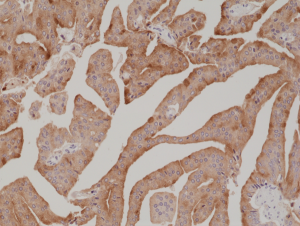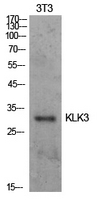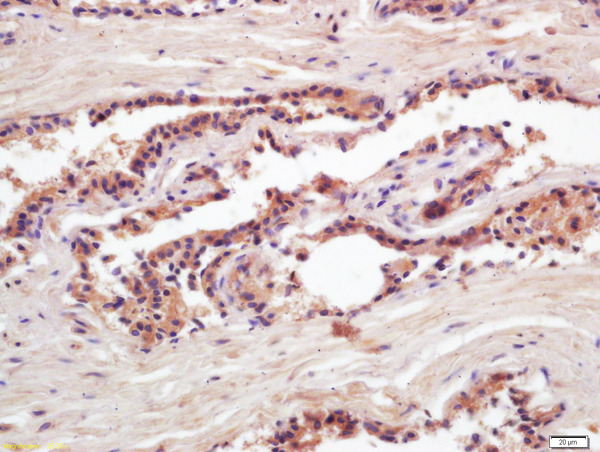
Immunohistochemical staining of formalin fixed and paraffin embedded human prostate cancer tissue section using anti-PSA rabbit monoclonal antibody (Clone RM323) at a 1:1000 dilution.
anti-PSA (human), Rabbit Monoclonal (RM323)
REV-31-1210-00
ApplicationsWestern Blot, ELISA, ImmunoHistoChemistry
Product group Antibodies
ReactivityHuman
TargetKLK3
Overview
- SupplierRevMAb Biosciences
- Product Nameanti-PSA (human), Rabbit Monoclonal (RM323)
- Delivery Days Customer2
- ApplicationsWestern Blot, ELISA, ImmunoHistoChemistry
- CertificationResearch Use Only
- ClonalityMonoclonal
- Clone IDRM323
- Gene ID354
- Target nameKLK3
- Target descriptionkallikrein related peptidase 3
- Target synonymsAPS, KLK2A1, PSA, hK3, prostate-specific antigen, P-30 antigen, gamma-seminoprotein, kallikrein-3, semenogelase, seminin
- HostRabbit
- IsotypeIgG
- Protein IDP07288
- Protein NameProstate-specific antigen
- Scientific DescriptionProstate-specific antigen (PSA) is a chymotrypsin-like serine protease (kallikrein family) produced by the prostate epithelium and is abundant in seminal fluid. PSA can be detected in the sera of patients with prostatic carcinoma. It is predominantly complexed to a liver-derived serine protease inhibitor, alpha-1-antichymotrypsin (ACT). A higher proportion of serum PSA is complexed to ACT in prostate cancer than in benign prostate hyperplasia. PSA is used to confirm prostatic acinar cell origin in primary and metastatic carcinoma and to rule out non-prostatic carcinoma mimics. - Recombinant Antibody. This antibody reacts to native human PSA (Prostate Specific Antigen), including both free (unbound) form and in a complex with ACT (alpha 1-antichymotrypsin). It may react to reduced PSA at a higher concentration. Applications: WB, IHC, ELISA. Source: Rabbit. Liquid. 50% Glycerol/PBS with 1% BSA and 0.09% sodium azide. Prostate-specific antigen (PSA) is a chymotrypsin-like serine protease (kallikrein family) produced by the prostate epithelium and is abundant in seminal fluid. PSA can be detected in the sera of patients with prostatic carcinoma. It is predominantly complexed to a liver-derived serine protease inhibitor, alpha-1-antichymotrypsin (ACT). A higher proportion of serum PSA is complexed to ACT in prostate cancer than in benign prostate hyperplasia. PSA is used to confirm prostatic acinar cell origin in primary and metastatic carcinoma and to rule out non-prostatic carcinoma mimics.
- ReactivityHuman
- Storage Instruction-20°C,2°C to 8°C
- UNSPSC41116161








